吴裕雄--天生自然 PYTHON数据分析:人类发展报告——HDI, GDI,健康,全球人口数据数据分析
Posted tszr
tags:
篇首语:本文由小常识网(cha138.com)小编为大家整理,主要介绍了吴裕雄--天生自然 PYTHON数据分析:人类发展报告——HDI, GDI,健康,全球人口数据数据分析相关的知识,希望对你有一定的参考价值。

import pandas as pd # Data analysis import numpy as np #Data analysis import seaborn as sns # Data visualization import matplotlib.pyplot as plt # Data Visualization import matplotlib.gridspec as gridspec # subplots and grid from wordcloud import WordCloud, STOPWORDS # Visualize text import json import folium # Map import folium.plugins as plugins # Map from mpl_toolkits.basemap import Basemap # Map import warnings warnings.filterwarnings(‘ignore‘) import scipy.stats import gc # Plotting style and setting plt.style.use(‘fivethirtyeight‘) #Plot style #plt.style.use(‘bmh‘) plt.rc(‘axes‘, labelsize=12) # plot setting plt.rc(‘xtick‘, labelsize=12) plt.rc(‘ytick‘, labelsize=12) pd.options.display.max_rows = 100 % matplotlib inline
#path = ‘file/‘ # local file loaction path = ‘F:\\\\kaggleDataSet\\\\human-development\\\\‘ loan = pd.read_csv(path+‘kiva_loans.csv‘) mpi = pd.read_csv(path+‘kiva_mpi_region_locations.csv‘) #loan_theme = pd.read_csv(path+‘loan_theme_ids.csv‘) #loan_theme_region = pd.read_csv(path+‘loan_themes_by_region.csv‘) # MPI #mpi_world = pd.read_csv(‘file/MPI_national.csv‘) #mpi_subnational = pd.read_csv(‘file/MPI_subnational.csv‘) #HDI path = ‘F:\\\\kaggleDataSet\\\\human-development\\\\‘ hdi = pd.read_csv(path+‘HDI.csv‘) continent_hdi = pd.read_csv(path+‘Continent_HDI.csv‘) geo_world_data = json.load(open(path+‘countries.geojson‘))
loan.head()
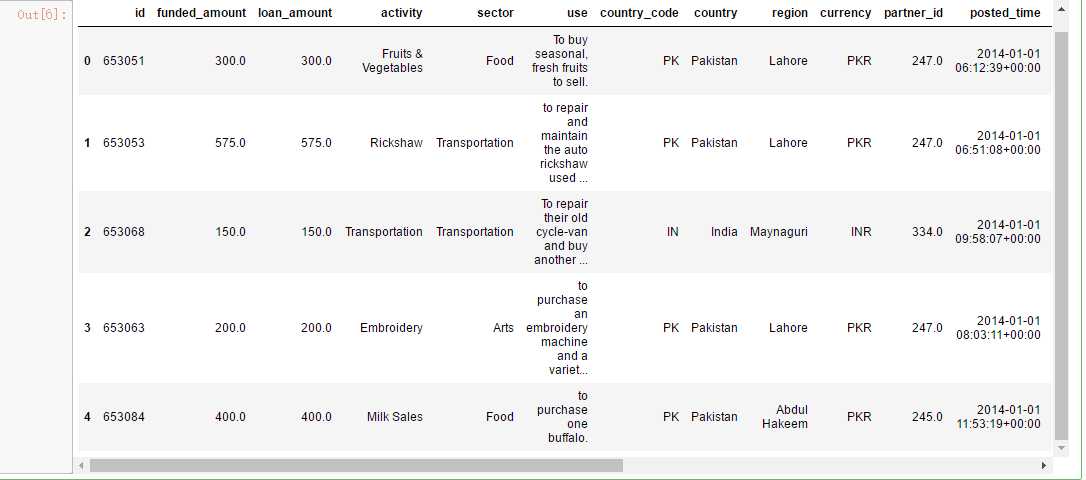
loan.describe()
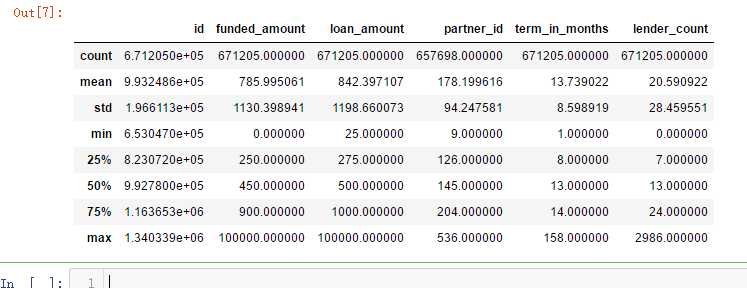
loan.describe(include=[‘O‘]) # Discribe categorical data

mpi.head()

mpi.describe(include=[‘O‘]) # Discribe categorical data

f,ax = plt.subplots(1,3,figsize=(16,6)) sns.distplot(loan[‘funded_amount‘],ax=ax[0]) ax[0].set_title(‘Distribution of funded_amount‘) ax[0].set_xlabel(‘Funded Amount‘) ulimit = np.percentile(loan[‘funded_amount‘],99) llimit= np.percentile(loan[‘funded_amount‘],1) value = loan[(llimit<loan[‘funded_amount‘])&(loan[‘funded_amount‘]<ulimit)][‘funded_amount‘] sns.distplot(value,color=‘r‘,ax=ax[1]) ax[1].set_title(‘Distribution of funded_amount by removing outliers‘); ax[1].set_xlabel(‘Funded Amount‘) ax[2].scatter(np.sort(loan[‘funded_amount‘].values),range(loan.shape[0]),) ax[2].set_title(‘Distribution of funded_amount‘); ax[2].set_xlabel(‘Funded Amount‘) ax[2].set_ylabel(‘Index‘) plt.subplots_adjust(wspace=0.3)
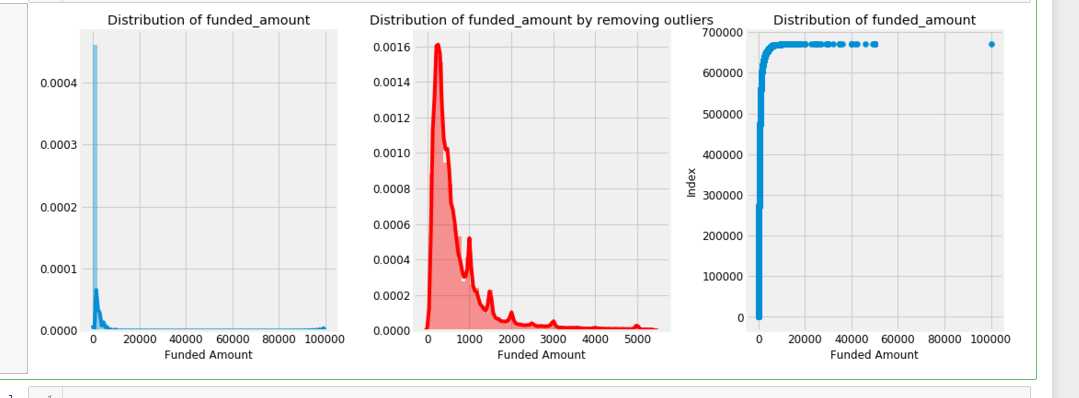
f,ax = plt.subplots(1,3,figsize=(16,6)) sns.distplot(loan[‘loan_amount‘],ax=ax[0]) ax[0].set_title(‘Distribution of Loan amount‘) ax[0].set_xlabel(‘Loan Amount‘) ulimit = np.percentile(loan[‘loan_amount‘],99) llimit= np.percentile(loan[‘loan_amount‘],1) value = loan[(llimit<loan[‘loan_amount‘])&(loan[‘loan_amount‘]<ulimit)][‘loan_amount‘] sns.distplot(value,color=‘r‘,ax=ax[1]) ax[1].set_xlabel(‘Loan Amount‘) ax[1].set_title(‘Distribution of Loan amount by removing outliers‘); ax[2].scatter(np.sort(loan[‘loan_amount‘].values),range(loan.shape[0]),) ax[2].set_title(‘Distribution of Loan amount‘); ax[2].set_xlabel(‘Loan Amount‘) ax[2].set_ylabel(‘Index‘) plt.subplots_adjust(wspace=0.3)
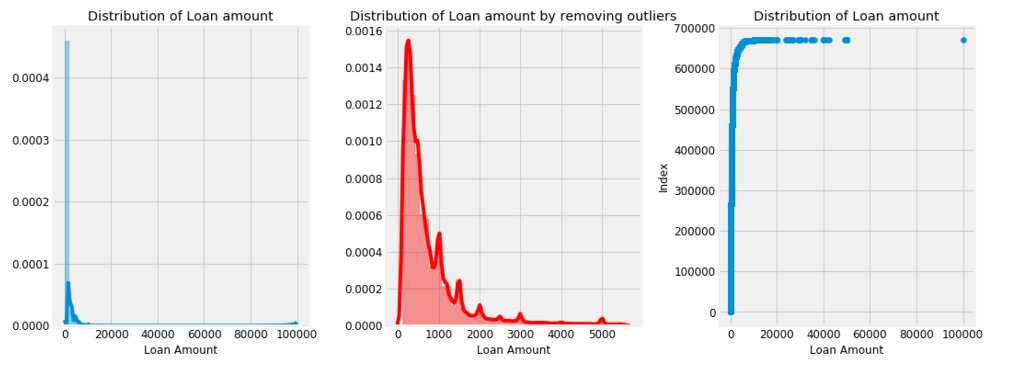
m = folium.Map(location=[0,0],zoom_start=2) poo = loan.groupby([‘country_code‘]).agg(‘count‘,‘count‘)[‘id‘].reset_index() m.choropleth(geo_data= geo_world_data,data = poo, columns=[‘country_code‘,‘count‘],key_on=‘feature.properties.wb_a2‘, name=‘Listed Country‘,fill_opacity=1,fill_color=‘YlOrBr‘, highlight=True,legend_name=‘Count‘) folium.LayerControl().add_to(m) m
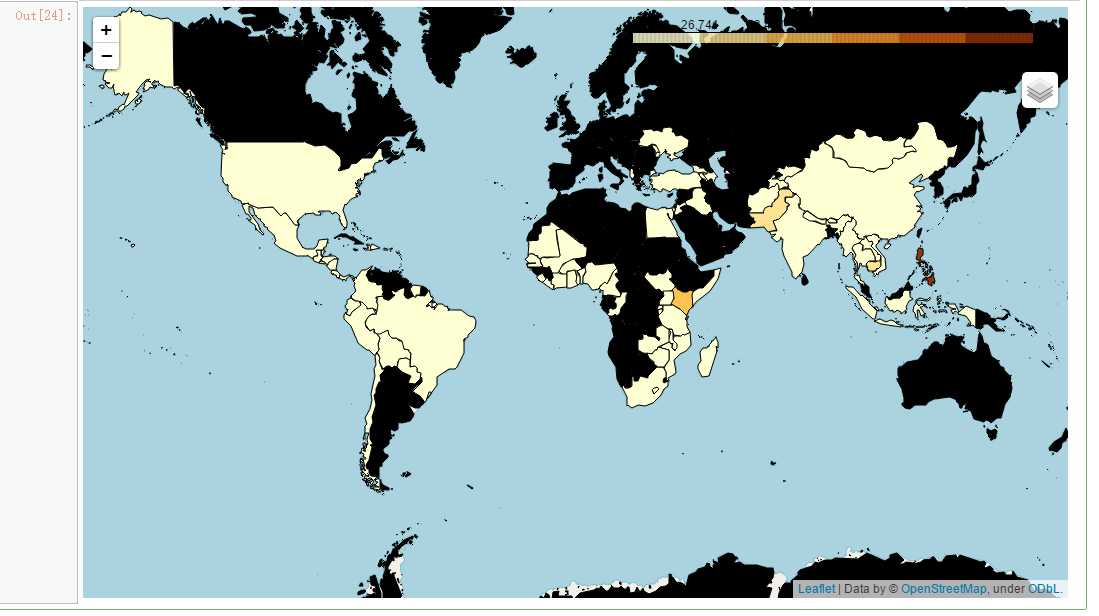
f,ax = plt.subplots(1,2,figsize=(16,8)) poo = loan[‘country‘].value_counts()[:10] sns.barplot(poo.values,poo.index, palette=‘Wistia‘, ax=ax[0]) ax[0].set_title(‘Distribution of Top listed Countries‘) ax[0].set_xlabel(‘Count‘) for i, v in enumerate(poo.values): ax[0].text(.6,i, round(v,2),fontsize=10,color=‘k‘) poo = loan.groupby(‘country‘).mean()[‘loan_amount‘].sort_values(ascending=False)[:10] sns.barplot(poo.values, poo.index, palette=‘cool‘, ax=ax[1]) ax[1].set_title(‘Distribution of Top Average loan amount by country‘) ax[1].set_ylabel(‘‘) ax[1].set_xlabel(‘Average Loan Amount‘) for i, v in enumerate(poo.values): ax[1].text(.6,i, round(v,2),fontsize=10,color=‘k‘) plt.subplots_adjust(wspace=0.5);
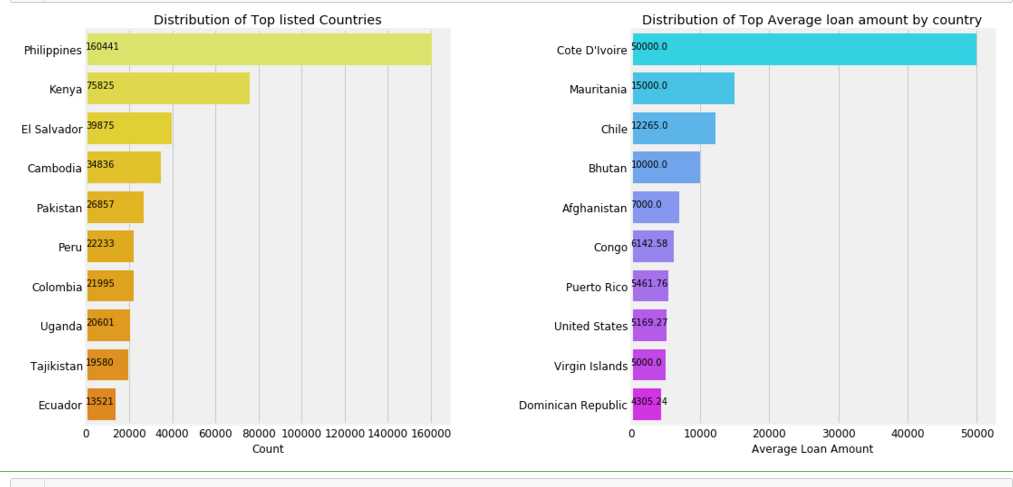
plt.figure(figsize=(16,8)) poo = loan.groupby(‘country‘).mean()[‘loan_amount‘].sort_values(ascending=False) sns.boxplot(loan[‘country‘], np.log(loan[‘loan_amount‘]), palette=‘spring‘,order=poo.index) plt.xlabel(‘‘) plt.ylabel(‘Loan amount ($log10$)‘) plt.title(‘Boxplot of loan amount($log10$)‘) plt.xticks(rotation=90);
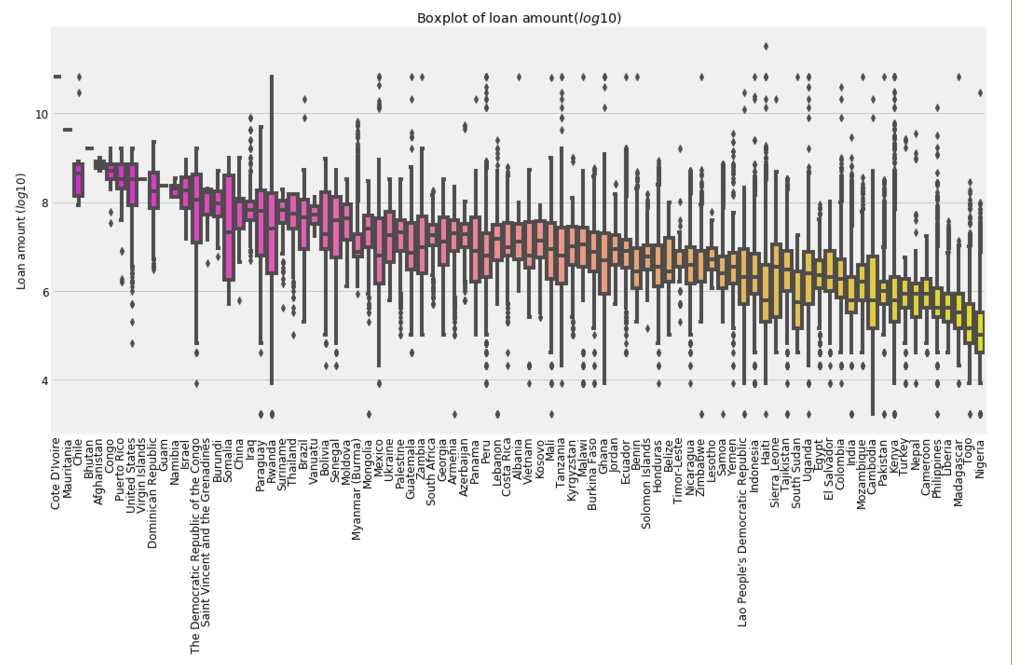
print("Cote D‘Ivoire",loan[loan[‘country‘] == "Cote D‘Ivoire"][‘loan_amount‘]) print("Mauritania",loan[loan[‘country‘] == "Mauritania"][‘loan_amount‘])

f,ax = plt.subplots(1,2,figsize=(16,8)) poo = loan[‘region‘].value_counts()[:10] sns.barplot(poo.values,poo.index, palette=‘Wistia‘, ax=ax[0]) ax[0].set_title(‘Distribution of Top listed Region‘) ax[0].set_xlabel(‘Count‘) for i, v in enumerate(poo.values): ax[0].text(.6,i, round(v,2),fontsize=10,color=‘k‘) poo = loan.groupby(‘region‘).mean()[‘loan_amount‘].sort_values(ascending=False)[:10] sns.barplot(poo.values, poo.index, palette=‘cool‘, ax=ax[1]) ax[1].set_title(‘Distribution of Top Average loan amount by Region‘) ax[1].set_ylabel(‘‘) ax[1].set_xlabel(‘Average Loan Amount‘) for i, v in enumerate(poo.values): ax[1].text(.6,i, round(v,2),fontsize=10,color=‘k‘) plt.subplots_adjust(wspace=0.5);
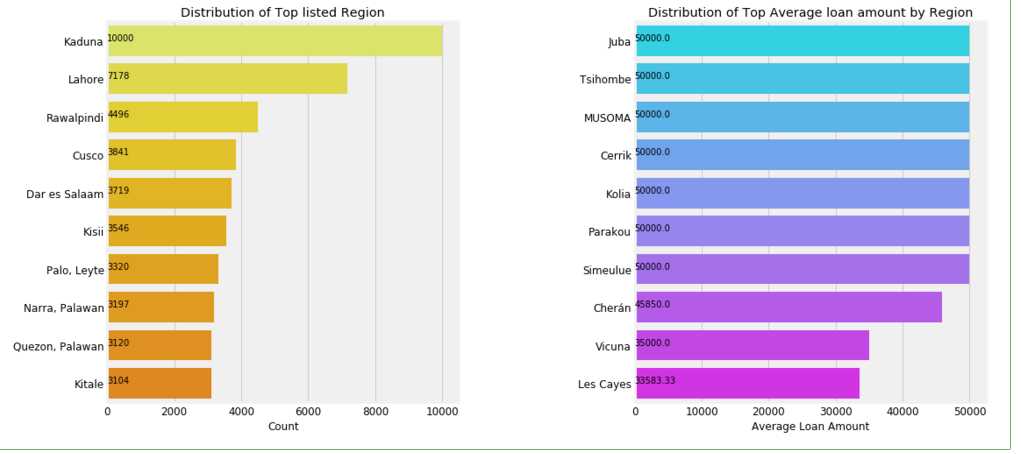
plt.figure( figsize =(16,8)) gridspec.GridSpec(2,2) plt.subplot2grid((1,2),(0,0)) poo = loan[‘sector‘].value_counts() #plt.pie(poo.values, labels = poo.index, autopct=‘%1.1f%%‘,colors=sns.color_palette(‘Wistia‘),startangle=60,) sns.barplot(poo.values,poo.index,palette=‘Wistia‘) for i, v in enumerate(poo.values): plt.text(.6,i, round(v,2),fontsize=10,color=‘k‘) plt.title(‘Distribution of listed sector‘) plt.subplot2grid((1,2),(0,1)) poo = loan.groupby(‘sector‘).mean()[‘loan_amount‘].sort_values(ascending=False) sns.barplot(poo.values,poo.index,palette=‘cool‘) plt.title(‘Distribution of Average loan amount by sector‘) plt.xlabel(‘Average Loan Amount‘) for i, v in enumerate(poo.values): plt.text(.6,i, round(v,2),fontsize=10,color=‘k‘)
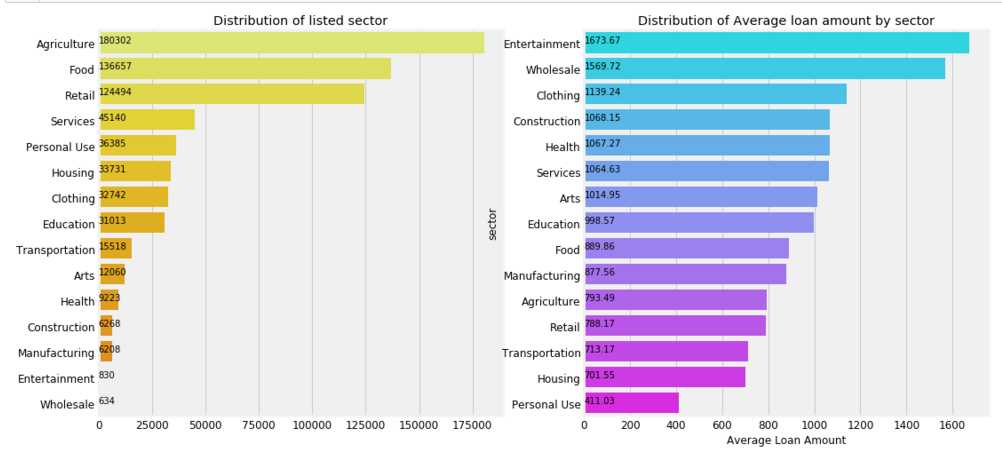
# Joy plot tmp = loan[[‘loan_amount‘,‘sector‘]] tmp[‘loan_amount‘] = np.log(tmp[‘loan_amount‘]) g = sns.FacetGrid(tmp,row=‘sector‘,hue=‘sector‘,aspect=15, size=0.6) # Draw the densities in a few steps g.map(sns.kdeplot, "loan_amount", clip_on=False, shade=True, alpha=1, lw=1.5, bw=.2) g.map(sns.kdeplot, "loan_amount", clip_on=False, color="w", lw=2, bw=.2) g.map(plt.axhline, y=0, lw=2, clip_on=False) # Define and use a simple function to label the plot in axes coordinates def label(x, color, label): ax = plt.gca() ax.text(0, .2, label, fontweight="bold", color=color, ha="left", va="center", transform=ax.transAxes) g.map(label, "loan_amount") # Set the subplots to overlap g.fig.subplots_adjust(hspace=0) # Remove axes details that don‘t play will with overlap g.set_titles("") g.set(yticks=[]) g.set(xlabel = ‘loan amount (log)‘) g.despine(bottom=True, left=True) g.savefig(‘F:\\\\joy.png‘)
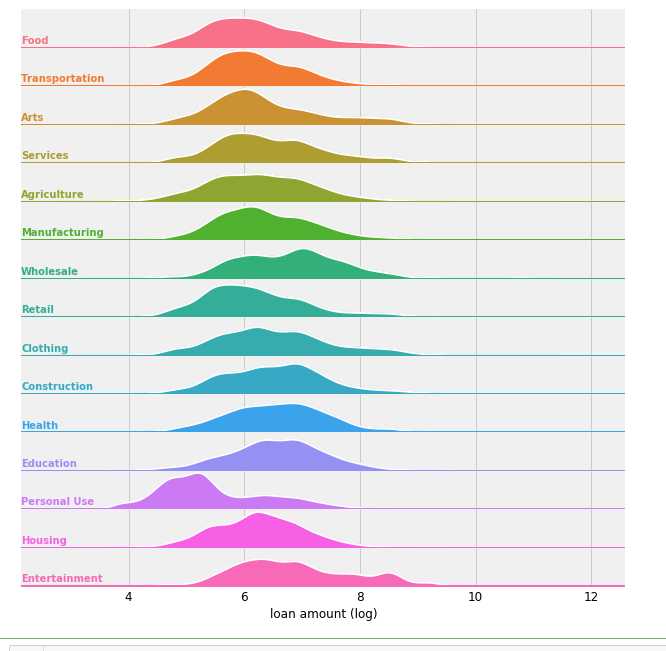
f,ax = plt.subplots(1,2,figsize=(16,8)) poo = loan[‘activity‘].value_counts()[:10] sns.barplot(poo.values,poo.index, palette=‘Wistia‘,ax= ax[0]) ax[0].set_title(‘Distribution of Top listed Activity‘) ax[0].set_xlabel(‘Count‘) for i, v in enumerate(poo.values): ax[0].text(.6,i, round(v,2),fontsize=10,color=‘k‘) poo = loan.groupby(‘activity‘).mean()[‘loan_amount‘].sort_values(ascending=False)[:10] sns.barplot(poo.values, poo.index, palette=‘cool‘, ax=ax[1]) ax[1].set_title(‘Distribution of Top Average loan amount by activity‘) ax[1].set_ylabel(‘‘) ax[1].set_xlabel(‘Average Loan Amount‘) for i, v in enumerate(poo.values): ax[1].text(1,i, round(v,2),fontsize=10,color=‘k‘) plt.subplots_adjust(wspace=0.4)
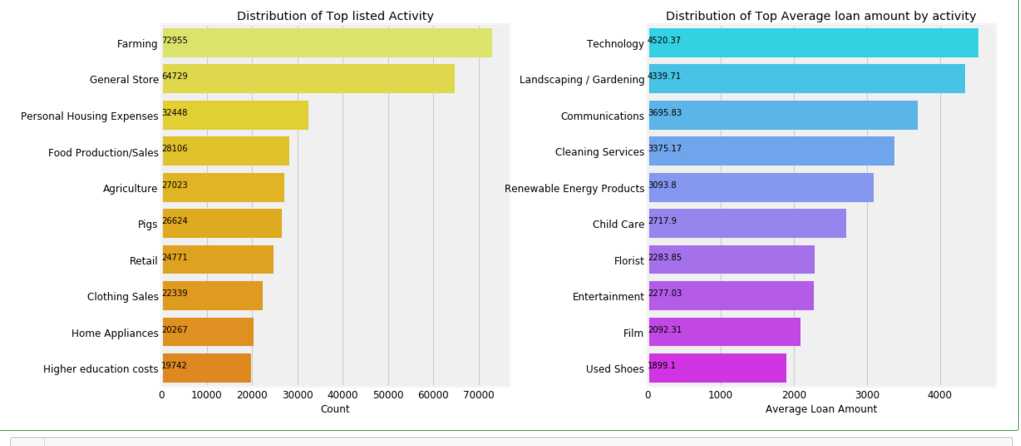
plt.figure(figsize =(16,8)) gridspec.GridSpec(2,2) plt.subplot2grid((1,2),(0,0)) poo = loan[‘repayment_interval‘].value_counts() plt.pie(poo.values,labels= poo.index,autopct=‘%1.1f%%‘,startangle=60,colors=sns.color_palette(‘cool‘,desat=.7)) plt.title(‘Distribution of listed repayment_interval‘) plt.subplot2grid((1,2),(0,1)) poo = loan.groupby(‘repayment_interval‘).mean()[‘loan_amount‘].sort_values(ascending=False) sns.barplot(poo.values,poo.index, palette=‘Wistia‘) plt.title(‘Distribution of Average loan amount by Repayment‘) plt.xlabel(‘Average Loan Amount‘) plt.ylabel(‘‘) for i, v in enumerate(poo.values): plt.text(1,i, round(v,2),fontsize=10,color=‘b‘) # Joy plot tmp = loan[[‘loan_amount‘,‘repayment_interval‘]] tmp[‘loan_amount‘] = np.log(tmp[‘loan_amount‘]) g = sns.FacetGrid(tmp,row=‘repayment_interval‘,hue=‘repayment_interval‘,aspect=15, size=0.6) # Draw the densities in a few steps g.map(sns.kdeplot, "loan_amount", clip_on=False, shade=True, alpha=1, lw=1.5, bw=.2) g.map(sns.kdeplot, "loan_amount", clip_on=False, color="w", lw=2, bw=.2) g.map(plt.axhline, y=0, lw=2, clip_on=False) # Define and use a simple function to label the plot in axes coordinates def label(x, color, label): ax = plt.gca() ax.text(0, .2, label, fontweight="bold", color=color, ha="left", va="center", transform=ax.transAxes) g.map(label, "loan_amount") # Set the subplots to overlap g.fig.subplots_adjust(hspace=0) # Remove axes details that don‘t play will with overlap g.set_titles("") g.set(yticks=[]) g.set(xlabel = ‘loan amount (log)‘) g.despine(bottom=True, left=True) plt.subplots_adjust(wspace=0.3);
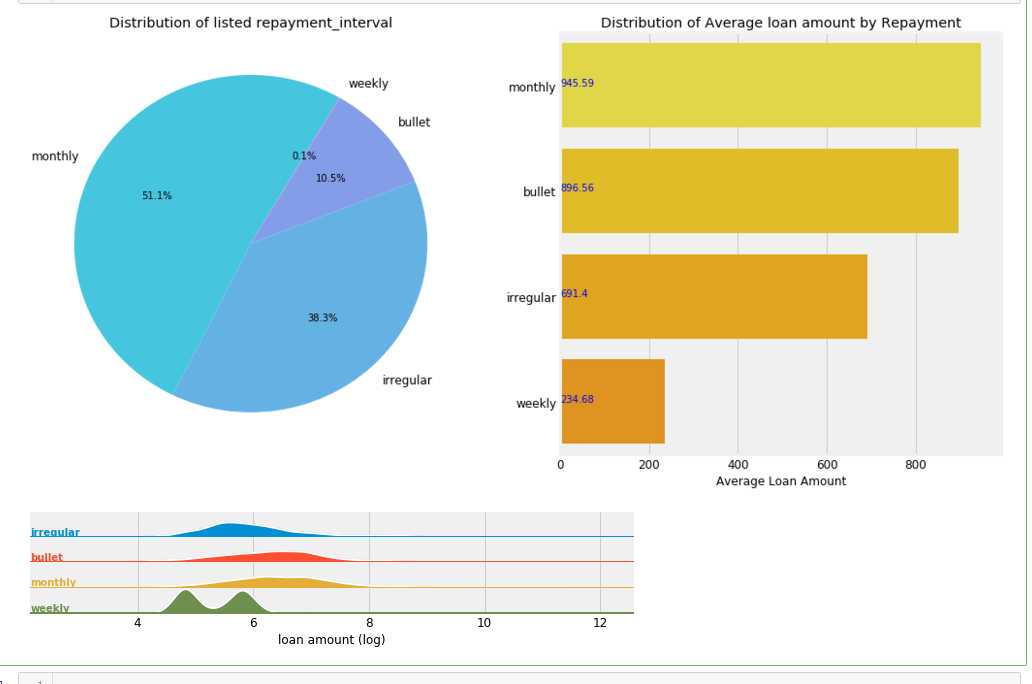
f,ax = plt.subplots(2,2,figsize=(16,12)) axs = ax.ravel() for i,c in enumerate(loan[‘repayment_interval‘].unique()): k = loan[loan[‘repayment_interval‘] == c] agg = k.groupby([‘country‘]).mean()[‘loan_amount‘].sort_values(ascending=False).dropna()[:10] if i<4: sns.barplot(x = agg.values,y = agg.index, ax= axs[i],palette=sns.color_palette(‘cool‘,n_colors=i+1)) axs[i].set_title(‘Average loan amount for country by \\n Repayment Interval: ‘.format(c)) axs[i].set_ylabel(‘‘) axs[i].set_xlabel(‘Average Loan amount‘) for j, v in enumerate(agg.values): axs[i].text(1,j, round(v,2),fontsize=10,color=‘k‘) plt.subplots_adjust(wspace=0.4,hspace=0.3)
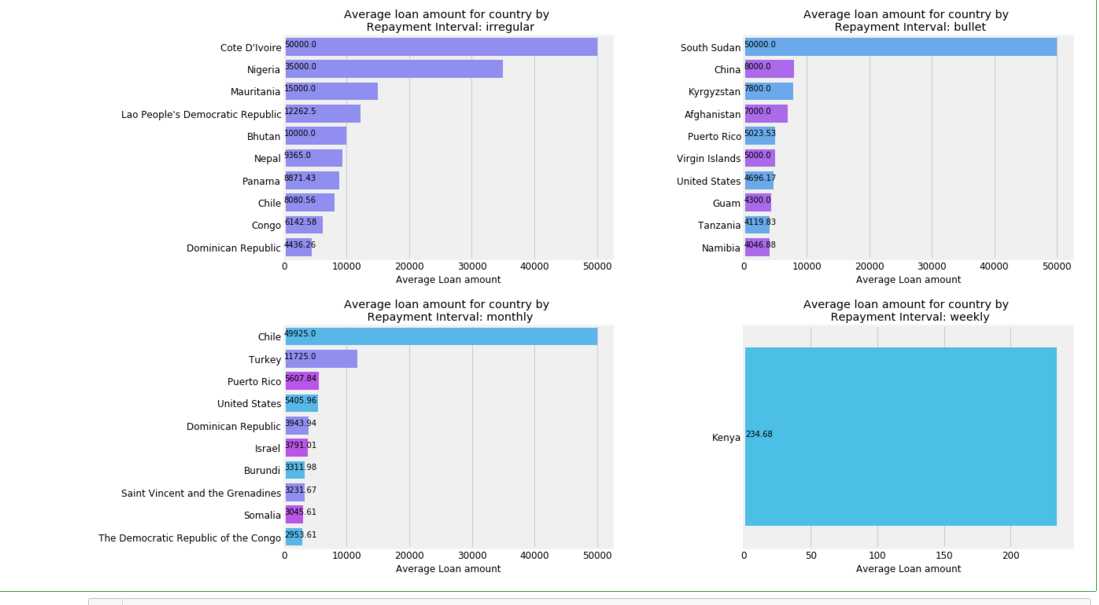
plt.figure(figsize=(16,6)) poo = loan[‘term_in_months‘].value_counts().iloc[:20] sns.barplot(y = poo.values, x = poo.index, palette= ‘cool‘,order=poo.index) plt.xticks(rotation=90) plt.xlabel(‘Month‘) plt.ylabel(‘Count‘) plt.title(‘Distribution of terms‘);
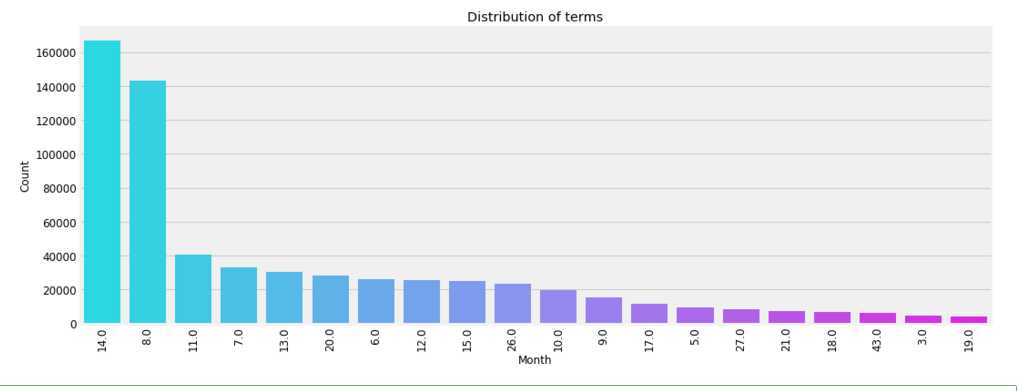
plt.figure(figsize=(16,6)) poo = loan[‘lender_count‘].value_counts().iloc[:20] sns.barplot(y = poo.values, x = poo.index, palette= ‘Wistia‘,order=poo.index) plt.xticks(rotation=90) plt.xlabel(‘Lender Count‘) plt.title(‘Distribution of Lender count ‘);
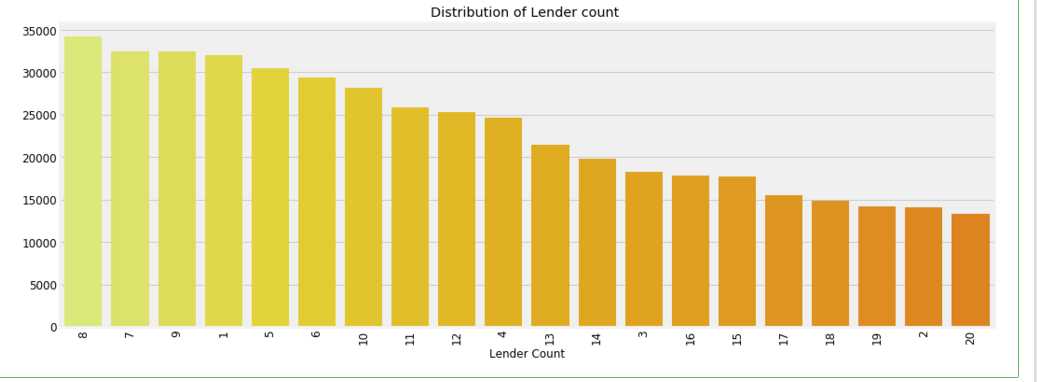
f,ax = plt.subplots(1,2,figsize=(16,6)) sns.distplot(loan[‘lender_count‘],ax=ax[0]) ax[0].set_title(‘Distribution of lender_count‘) ulimit = np.percentile(loan[‘lender_count‘],99) llimit= np.percentile(loan[‘lender_count‘],1) value = loan[(llimit<loan[‘lender_count‘])&(loan[‘lender_count‘]<ulimit)][‘lender_count‘] sns.distplot(value,color=‘r‘,ax=ax[1]) ax[1].set_title(‘Distribution of lender_count by removing outliers‘);
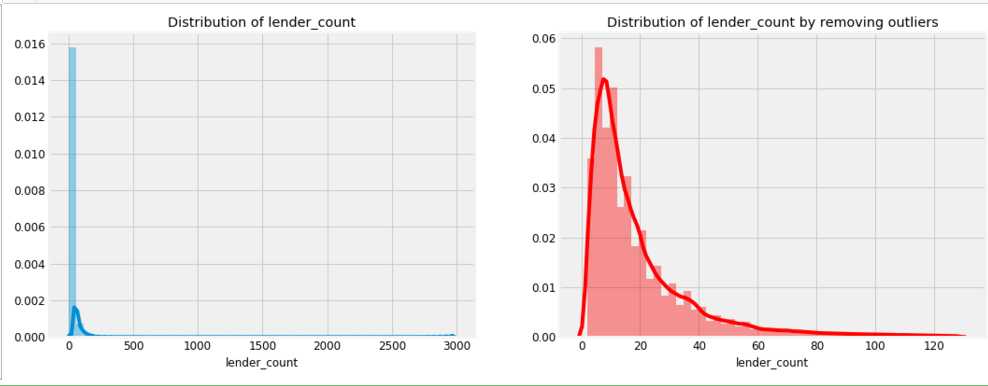
#use wc = (WordCloud(height= 1000,width=1600, stopwords=STOPWORDS,max_words=1000,background_color=‘white‘).generate(" ".join(loan[‘use‘].astype(str))) ) plt.figure(figsize=(16,10)) plt.imshow(wc) plt.axis(‘off‘) #plt.savefig(‘use_cloud.png‘) plt.title(‘Loan amount usage‘);
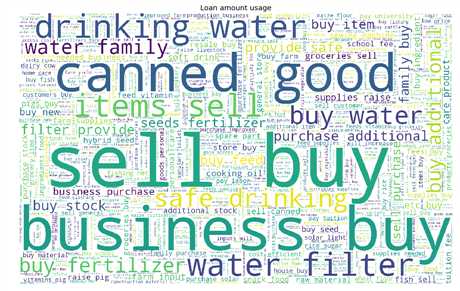
plt.figure(figsize=(16,10)) poo = loan[‘use‘].value_counts()[:10] sns.barplot(poo.values,poo.index, palette=‘Wistia‘) plt.title(‘Distribution of listed Use of Loan amount‘) plt.xlabel(‘Average Loan amount‘) for i, v in enumerate(poo.values): plt.text(.6,i, round(v,2),fontsize=10,color=‘k‘) plt.rc(‘ytick‘, labelsize=20); plt.rc(‘ytick‘, labelsize=10);
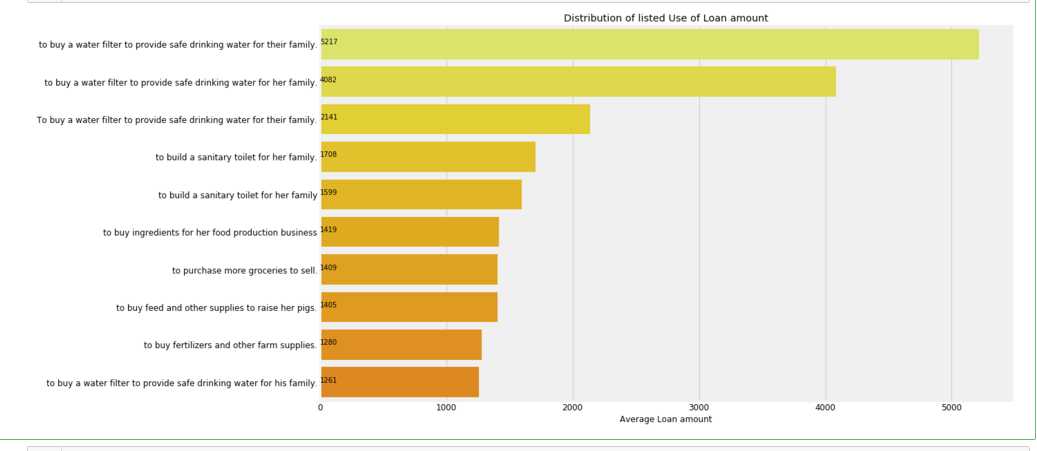
#tags wc = (WordCloud(height= 1000,width=1600, stopwords=STOPWORDS,max_words=1000,background_color=‘white‘).generate(" ".join(loan[‘tags‘].astype(str))) ) plt.figure(figsize=(16,10)) plt.imshow(wc) plt.axis(‘off‘) plt.title(‘Loan amount Tags‘);

gender = ",".join(loan[‘borrower_genders‘].astype(str).str.replace(‘ ‘,‘‘)) cnt = pd.DataFrame(gender.strip().split(‘,‘),columns=[‘Gender‘]) cnt = cnt[‘Gender‘].value_counts() f,ax = plt.subplots(1,2,figsize=(16,8)) ax[0].pie(cnt.values,labels=cnt.index,autopct=‘%0.1f%%‘) ax[0].set_title(‘Borrower Gender‘) poo = loan[‘borrower_genders‘].value_counts()[:5]*100/loan.shape[0] #ax[1].pie(poo.values,labels=poo.index,autopct=‘%0.1f%%‘) sns.barplot(poo.values,poo.index, palette=‘summer‘) ax[1].set_title(‘Distribution of listed Use of Loan amount‘) ax[1].set_xlabel(‘Average Loan amount‘) for i,v in enumerate(poo.values): ax[1].text(1,i,round(v,2),fontsize=12) ax[1].text(7,i,‘%‘,fontsize=12) plt.subplots_adjust(wspace=0.4)
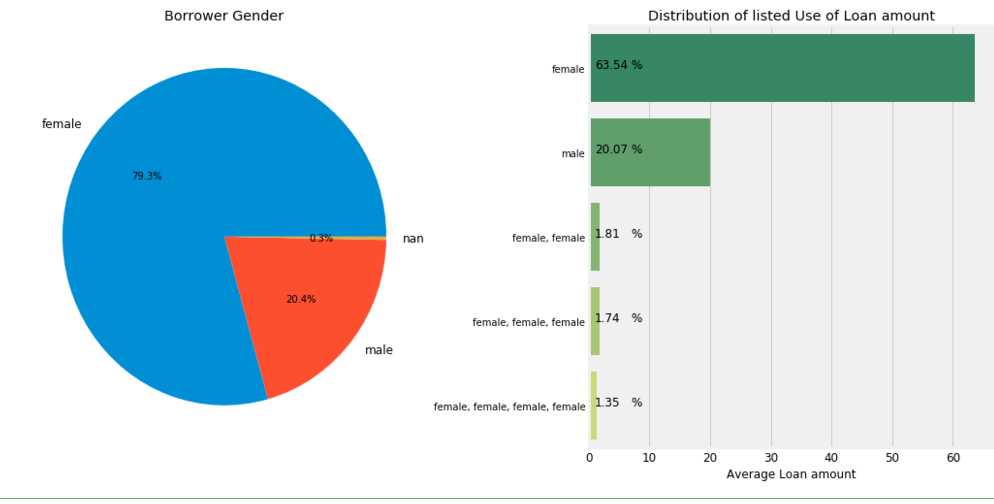
poo = (loan.groupby([‘borrower_genders‘,‘repayment_interval‘]).agg([‘count‘])[‘id‘].reset_index()) poo.loc[:,‘borrower_genders‘][~((poo[‘borrower_genders‘] == ‘female‘) |(poo[‘borrower_genders‘] == ‘male‘))] = ‘Group‘ plt.figure(figsize=(16,4)) cnt = poo.groupby([‘borrower_genders‘,‘repayment_interval‘])[‘count‘].sum().reset_index() cnt[‘count‘] = cnt[‘count‘]*100/cnt[‘count‘].sum() sns.barplot(y= cnt[‘count‘],x = cnt[‘repayment_interval‘],hue=cnt[‘borrower_genders‘],palette=‘rainbow‘) plt.title(‘Repayment interval by Gender %‘) plt.ylabel(‘%‘);

loan[‘date‘] = pd.to_datetime(loan[‘date‘]) loan[‘disbursed_time‘] = pd.to_datetime(loan[‘disbursed_time‘]) loan[‘funded_time‘] = pd.to_datetime(loan[‘funded_time‘]) loan[‘posted_time‘] = pd.to_datetime(loan[‘posted_time‘]) loan_ts = loan.set_index(‘date‘)
plt.figure(figsize=(16,6)) date_feature = [‘posted_time‘,‘funded_time‘] loan.set_index(‘posted_time‘)[‘loan_amount‘].resample(‘M‘).sum().plot() loan.set_index(‘posted_time‘)[‘funded_amount‘].resample(‘M‘).sum().plot() plt.legend()
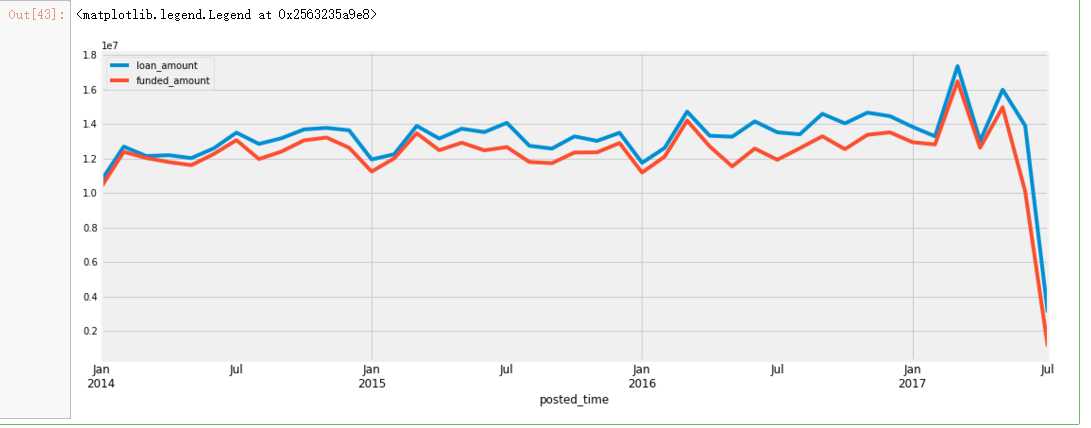
plt.figure(figsize=(16,10)) gridspec.GridSpec(2,2) # Agriclure plt.subplot2grid((2,2),(0,0)) poo = loan[loan[‘sector‘] ==‘Agriculture‘][‘activity‘].value_counts()[:10] sns.barplot(poo.values,poo.index,palette=‘Wistia‘) plt.ylabel(‘Activity‘) plt.xlabel(‘Count‘) plt.title(‘"Agriculture" Sector‘) for i, v in enumerate(poo.values): plt.text(.6,i, round(v,2),fontsize=10,color=‘k‘) plt.subplot2grid((2,2),(0,1)) poo = loan[loan[‘sector‘] ==‘Food‘][‘activity‘].value_counts()[:10] sns.barplot(poo.values,poo.index,palette=‘cool‘) plt.ylabel(‘Activity‘) plt.xlabel(‘Count‘) plt.title(‘"Food" Sector‘) for i, v in enumerate(poo.values): plt.text(.6,i, round(v,2),fontsize=10,color=‘k‘) plt.subplot2grid((2,2),(1,0)) poo = loan[loan[‘sector‘] ==‘Retail‘][‘activity‘].value_counts()[:10] sns.barplot(poo.values,poo.index,palette=‘cool‘) plt.ylabel(‘Activity‘) plt.xlabel(‘Count‘) plt.title(‘"Retail" Sector‘) for i, v in enumerate(poo.values): plt.text(.6,i, round(v,2),fontsize=10,color=‘k‘) plt.subplot2grid((2,2),(1,1)) poo = loan[loan[‘sector‘] ==‘Entertainment‘][‘activity‘].value_counts()[:10] sns.barplot(poo.values,poo.index,palette=‘magma‘) plt.ylabel(‘Activity‘) plt.xlabel(‘Count‘) plt.title(‘"Entertainment" Sector‘) for i, v in enumerate(poo.values): plt.text(.6,i, round(v,2),fontsize=10,color=‘k‘) plt.subplots_adjust(hspace=0.4,wspace=0.5);
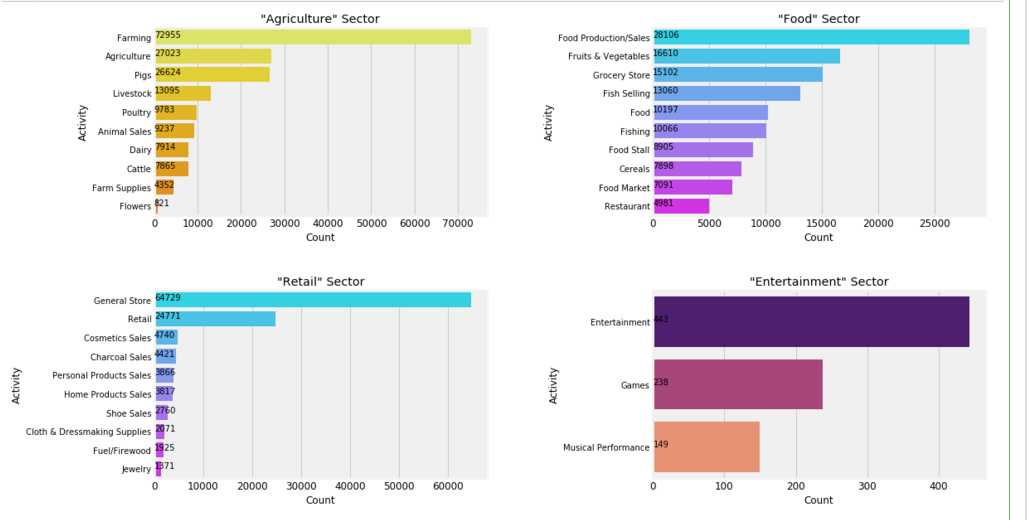
f,ax = plt.subplots(1,2,figsize=(16,6)) poo = mpi[‘world_region‘].value_counts() sns.barplot(poo.values, poo.index,palette=sns.color_palette(‘Wistia‘),ax=ax[0]) ax[0].set_title(‘Distribtution of MPI by world region‘) ax[0].set_xlabel(‘Count‘) for i, v in enumerate(poo.values): ax[0].text(.6,i, round(v,2),fontsize=10,color=‘k‘) agg = mpi.groupby([‘world_region‘]).mean()[‘MPI‘].sort_values().dropna().sort_values( ascending=False) sns.barplot(agg.values, agg.index,palette=sns.color_palette(‘cool‘),ax=ax[1]) ax[1].set_xlabel(‘Average MPI‘) ax[1].set_title(‘Average MPI by world region‘) for i, v in enumerate(poo.values): ax[1].text(0,i, round(v,2),fontsize=10,color=‘k‘) plt.subplots_adjust(wspace=0.6);
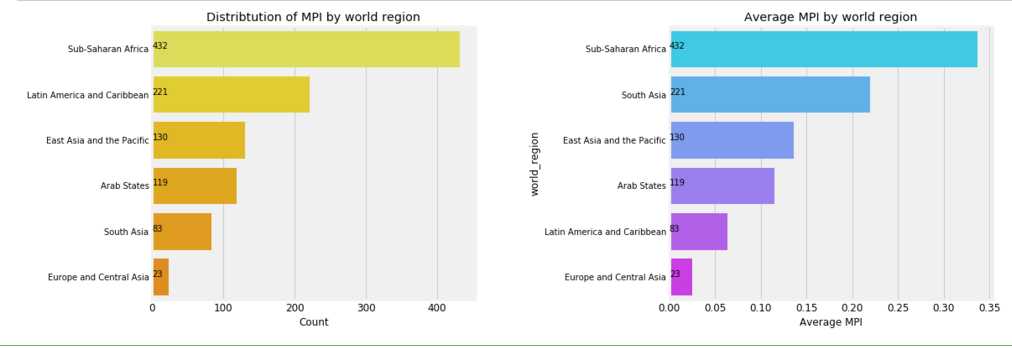
f,ax = plt.subplots(2,3,figsize=(16,12)) axs = ax.ravel() for i,c in enumerate(mpi[‘world_region‘].unique()): k = mpi[mpi[‘world_region‘] == c] agg = k.groupby([‘country‘]).mean()[‘MPI‘].sort_values(ascending=False).dropna()[:10] if i<6: sns.barplot(x = agg.values,y = agg.index, ax= axs[i],palette=sns.color_palette(‘cool‘,n_colors=i+1)) axs[i].set_title(‘Region: \\n ‘.format(c)) axs[i].set_xlabel(‘Average MPI‘) axs[i].set_ylabel(‘‘) for j, v in enumerate(agg.values): axs[i].text(0,j,round(v,2),fontsize=10,color=‘k‘) plt.subplots_adjust(wspace=0.5,hspace=0.3);
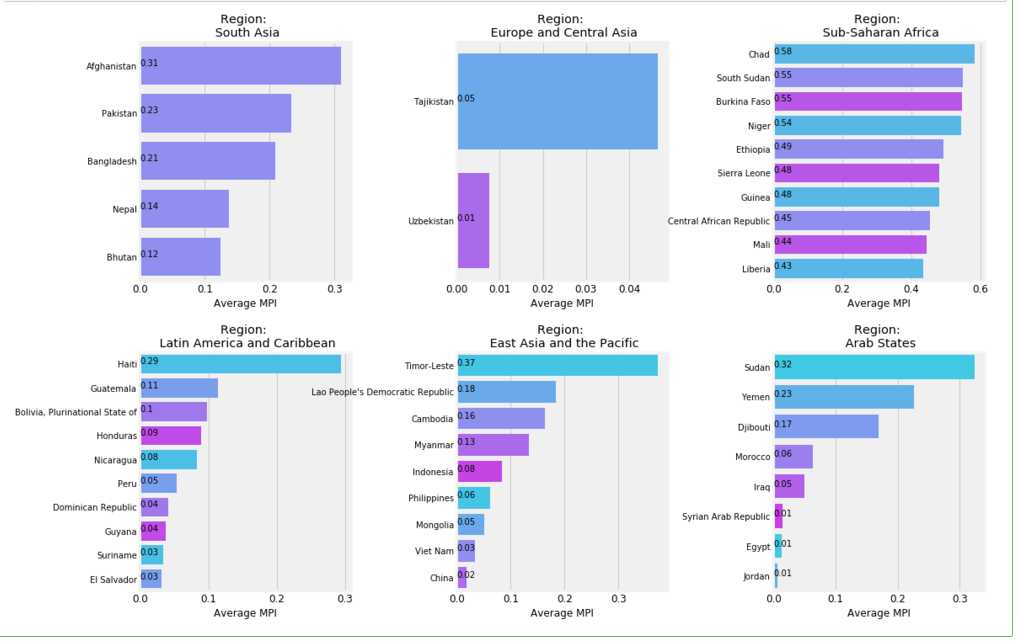
f,ax = plt.subplots(1,2,figsize=(16,6)) agg = mpi.groupby([‘country‘]).mean()[‘MPI‘].sort_values().dropna().sort_values( ascending=False)[:10] sns.barplot(agg.values, agg.index,palette=‘Wistia‘,ax=ax[0]) ax[0].set_title(‘Distribtution of MPI by country‘) ax[0].set_xlabel(‘Average MPI‘) for i, v in enumerate(agg.values): ax[0].text(0,i, round(v,2),fontsize=10,color=‘k‘) agg = mpi.groupby([‘LocationName‘]).mean()[‘MPI‘].sort_values().dropna().sort_values( ascending=False)[:10] sns.barplot(agg.values, agg.index,palette=‘cool‘,ax=ax[1]) for i, v in enumerate(agg.values): ax[1].text(0,i, round(v,2),fontsize=10,color=‘k‘) ax[1].set_title(‘Average MPI by Location Name‘) ax[0].set_xlabel(‘Average MPI‘) plt.subplots_adjust(wspace=0.6);
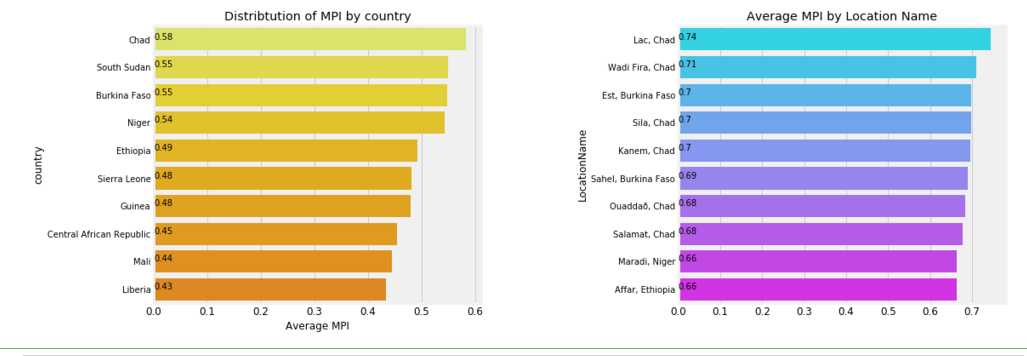
# MPI plt.figure(figsize=(16,10)) m = Basemap(projection=‘cyl‘,resolution=‘c‘,) m.drawcoastlines(linewidth=0.1, color="white") m.fillcontinents(color=‘#f2f2f2‘,lake_color=‘#46bcec‘) m.drawmapboundary(fill_color=‘#A6CAE0‘, linewidth=0.1) #m.bluemarble(alpha=0.4) m.shadedrelief() values = mpi[‘MPI‘] mloc = m(mpi[‘lon‘],mpi[‘lat‘]) m.scatter(mloc[0],mloc[1],c = values,zorder=20,cmap=‘hot_r‘) m.colorbar() plt.title(‘Distribution of MPI‘) plt.show() m gc.collect();
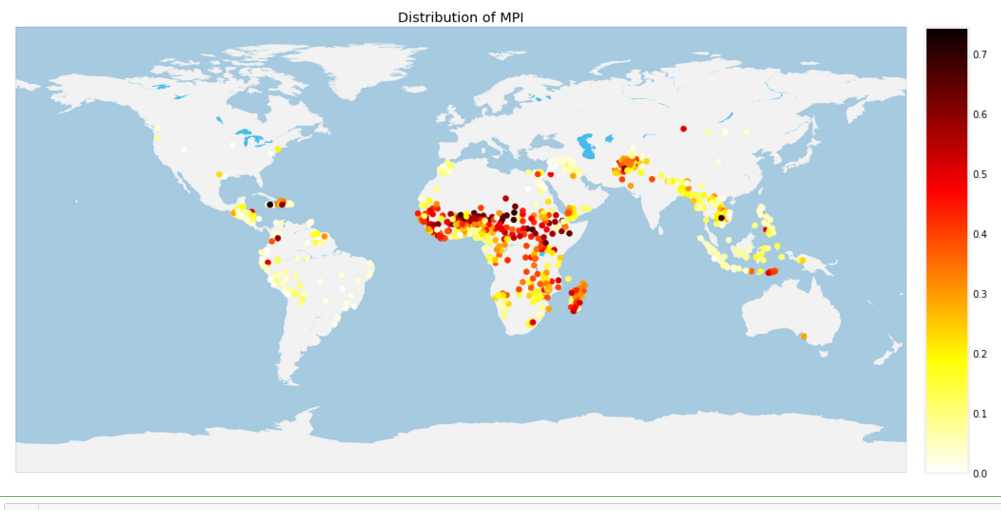
# http://nbviewer.jupyter.org/github/python-visualization/folium/blob/master/examples/MarkerCluster.ipynb loc = mpi[[‘lon‘,‘lat‘,‘region‘,‘MPI‘]].dropna() m1 = folium.Map(location=[0,0],zoom_start=2) locations = list(zip(loc[‘lat‘],loc[‘lon‘])) popups = [‘lat: lon: <br> MPI: ‘.format(round(lat,2),round(lon,2),m) for (lat,lon,m) in zip(mpi[‘lat‘],mpi[‘lon‘],mpi[‘MPI‘])] marker = plugins.MarkerCluster(locations, popups=popups) marker.add_to(m1) m1
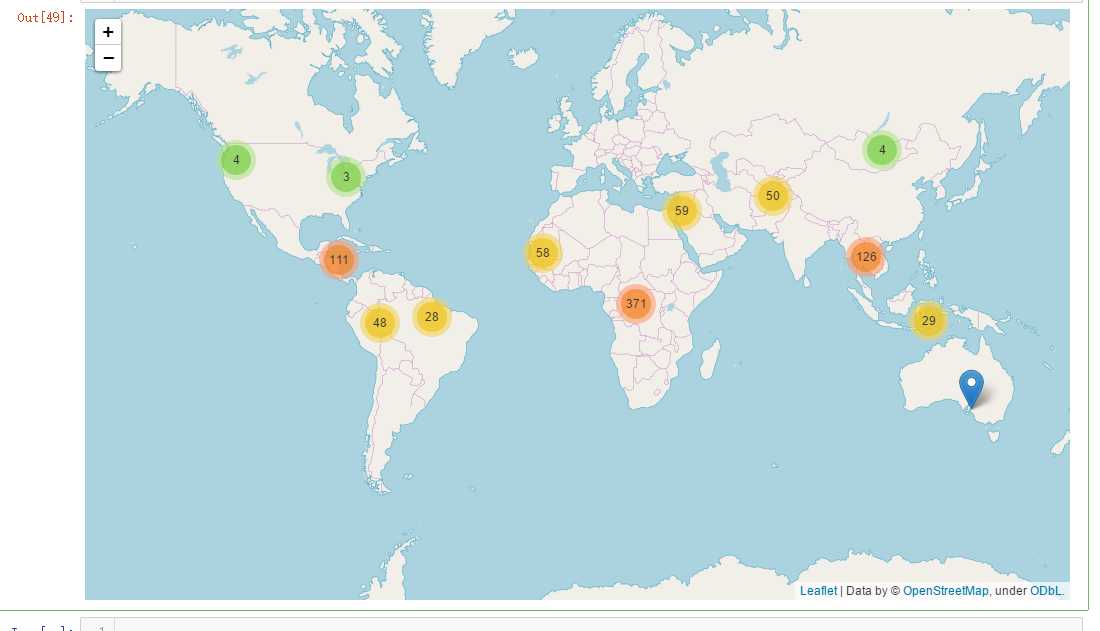
gc.collect()
hdi.head()

continent_hdi.head()
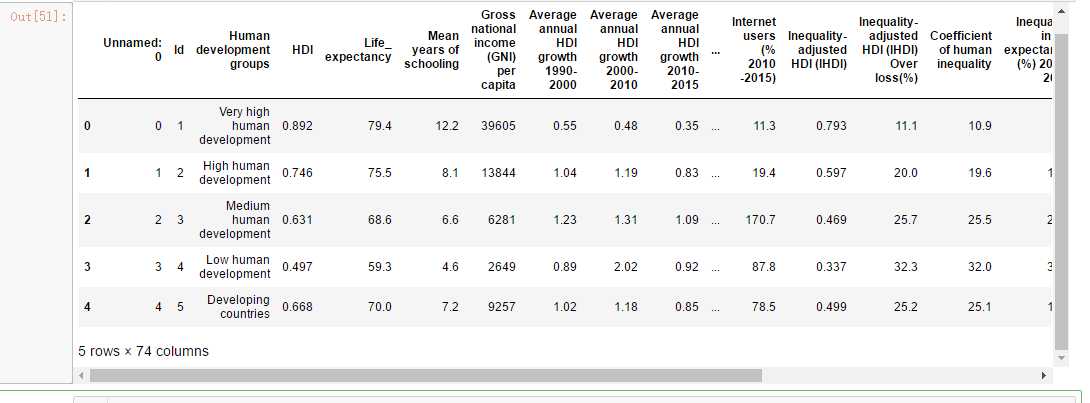
kiva_country = loan[‘country‘].unique() len(kiva_country) kiva_hdi = hdi[hdi[‘Country‘].apply(lambda c: c in kiva_country)] kiva_hdi[‘Country‘].apply(lambda c: c in kiva_country)

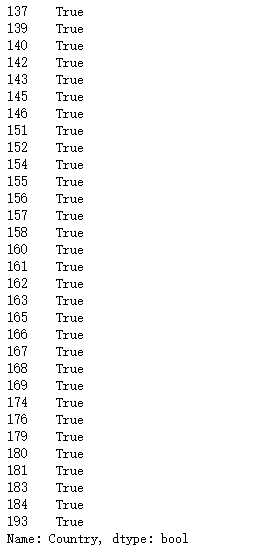
m = folium.Map(location=[0,0],zoom_start=2) m.choropleth(geo_data= geo_world_data,data = hdi, columns=[‘Country‘,‘HDI‘],key_on=‘feature.properties.name‘,name=‘HDI‘,fill_opacity=1,fill_color=‘GnBu‘,highlight=True, legend_name=‘HDI‘) folium.LayerControl().add_to(m) m
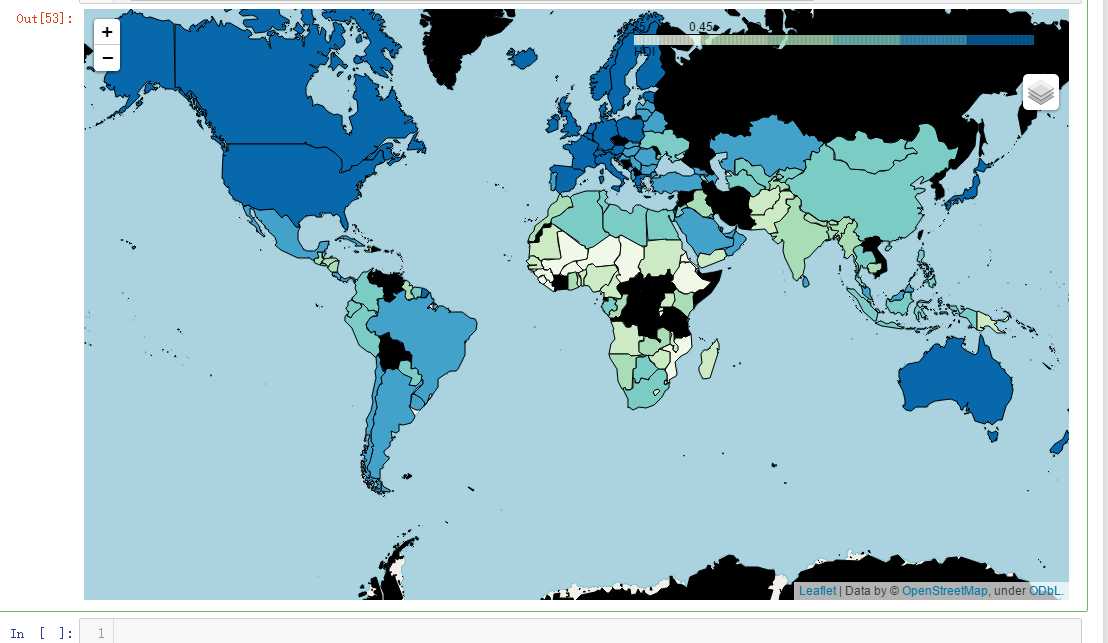
f,ax = plt.subplots(1,2,figsize=(16,6)) value = (hdi[[‘HDI‘,‘Country‘]].sort_values(by=‘HDI‘)[:10]) sns.barplot(value[‘HDI‘],value[‘Country‘],palette=‘cool‘,ax=ax[0]) ax[0].set_title(‘Bottom 10 country by HDI‘) for i, v in enumerate(value[‘HDI‘]): ax[0].text(0,i, round(v,2),fontsize=10,color=‘k‘) value = (hdi[[‘HDI‘,‘Country‘]].sort_values(by=‘HDI‘,ascending=False)[:10]) sns.barplot(value[‘HDI‘],value[‘Country‘],palette=‘Wistia‘,ax=ax[1]) ax[1].set_title(‘Top 10 country by HDI‘); for i, v in enumerate(value[‘HDI‘]): ax[1].text(0,i, round(v,2),fontsize=10,color=‘k‘)
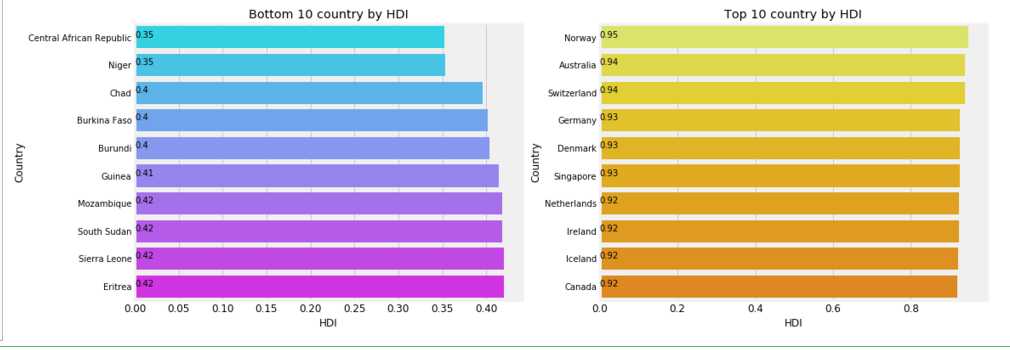
### col = hdi.columns[hdi.columns.str.contains(‘HDI‘)] col = [‘HDI‘,‘Human Development Index (HDI) Female‘,‘Human Development Index (HDI) Male‘] f,ax = plt.subplots(figsize=(16,6)) for i,C in enumerate(col): hdi[C].plot(kind=‘kde‘,ax=ax,color=‘C‘.format(i)) mean = hdi[C].mean() ax.axvline(mean,c=‘C‘.format(i)) print(‘Mean value of : ‘.format(C,mean,)) #ax.text(round(mean,0),0.1,round(mean,2)) ax.legend() plt.title(‘Human Development Index (HDI)‘) #plt.savefig(‘hdi.png‘);
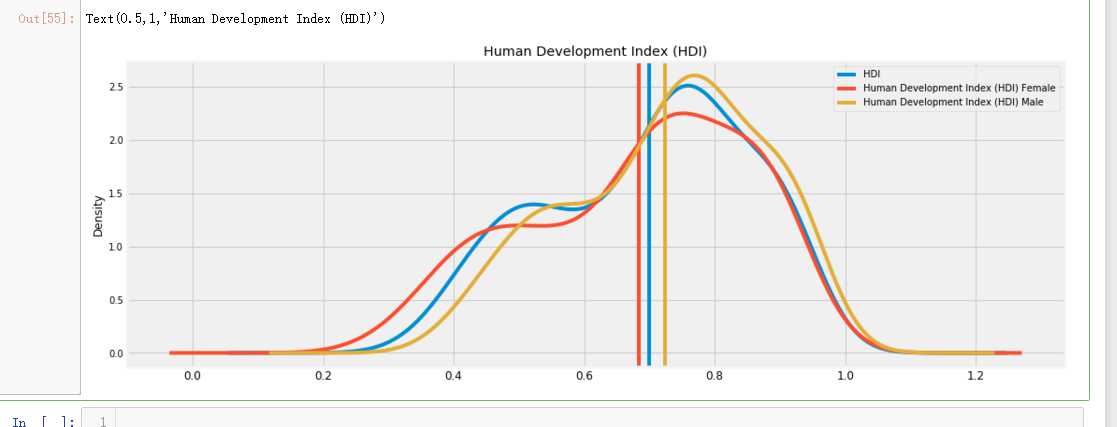
f,ax=plt.subplots(figsize=(16,6)) continent_hdi[[‘Human development groups‘,‘Average annual HDI growth 1990-2000‘,‘Average annual HDI growth 2000-2010‘, ‘Average annual HDI growth 2010-2015‘,‘Average annual HDI growth 1990-2015‘,‘HDI‘]].plot(ax=ax) plt.xticks(np.arange(14),continent_hdi[‘Human development groups‘],rotation=90);
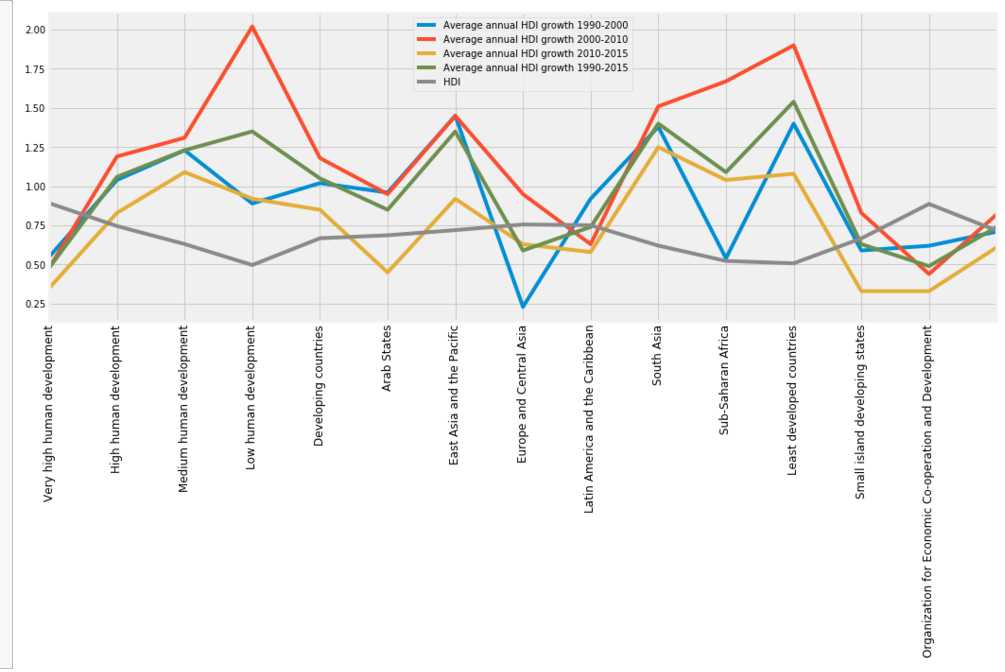
col = hdi.columns[hdi.columns.str.startswith(‘Life expectancy‘)] f,ax = plt.subplots(figsize=(16,6)) for i,C in enumerate(col): hdi[C].plot(kind=‘kde‘,ax=ax,c=‘C‘.format(i)) mean = hdi[C].mean() ax.axvline(mean,c=‘C‘.format(i)) print(‘Mean value of : ‘.format(C,mean,)) #ax.text(round(mean,0),0.1,round(mean,2)) ax.legend() plt.title(‘Life expectancy‘);
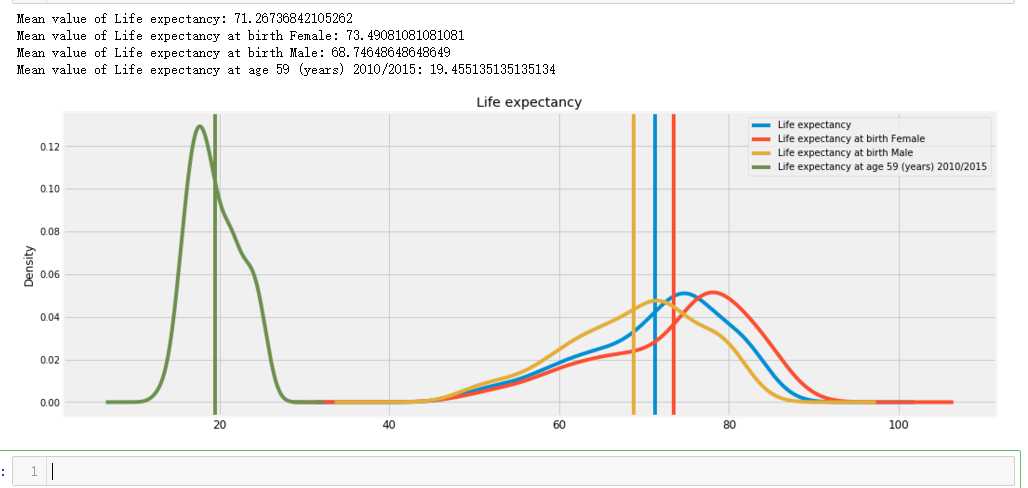
col = hdi.columns[hdi.columns.str.startswith(‘Mean years‘)] f,ax = plt.subplots(figsize=(16,6)) for i,C in enumerate(col): hdi[C].plot(kind=‘kde‘,ax=ax,c=‘C‘.format(i)) mean = hdi[C].mean() ax.axvline(mean,c=‘C‘.format(i)) print(‘Mean value of : ‘.format(C,mean,)) #ax.text(round(mean,0),0.1,round(mean,2)) ax.legend() plt.title(‘Mean value of Schooling‘);
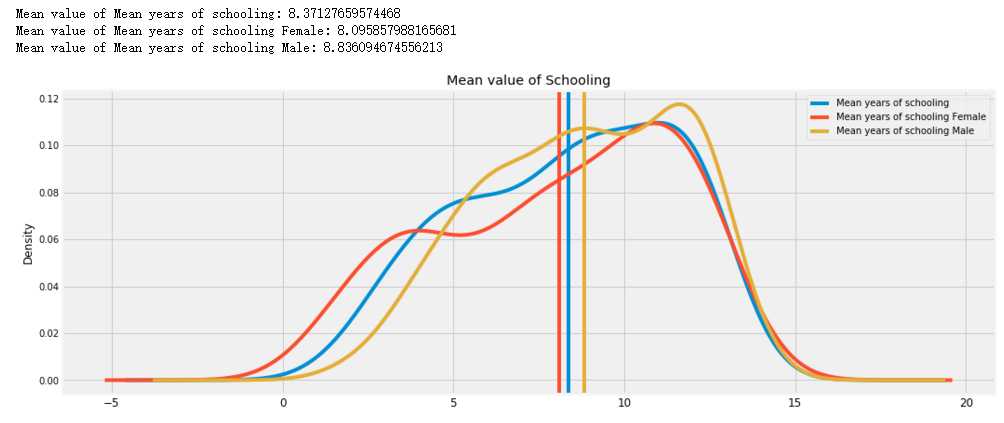
f,ax=plt.subplots(figsize=(16,6)) col = continent_hdi.columns[continent_hdi.columns.str.startswith(‘Mean years‘)] continent_hdi[col].plot(ax=ax,kind=‘bar‘) plt.xticks(np.arange(15),continent_hdi[‘Human development groups‘],rotation=90);
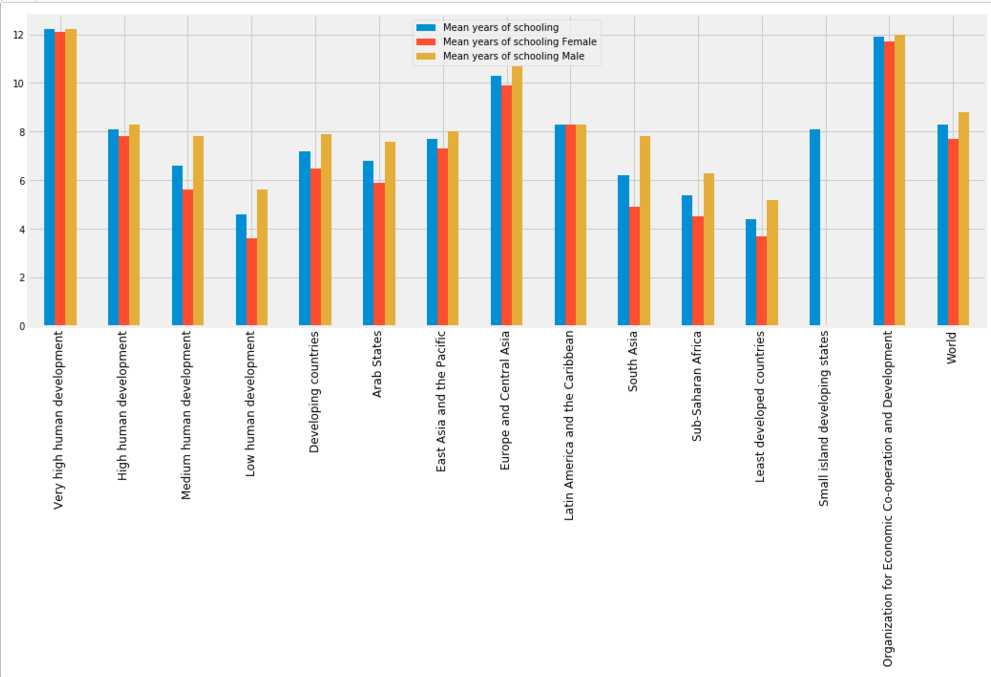
f,ax=plt.subplots(figsize=(16,6)) continent_hdi[‘Share of seats in parliament (% held by women)‘].plot(kind=‘bar‘,ax=ax) plt.xticks(np.arange(15),continent_hdi[‘Human development groups‘],rotation=90) for i,v in enumerate(continent_hdi[‘Share of seats in parliament (% held by women)‘]): plt.text(i,2,round(v,2),fontsize=12,rotation=90);
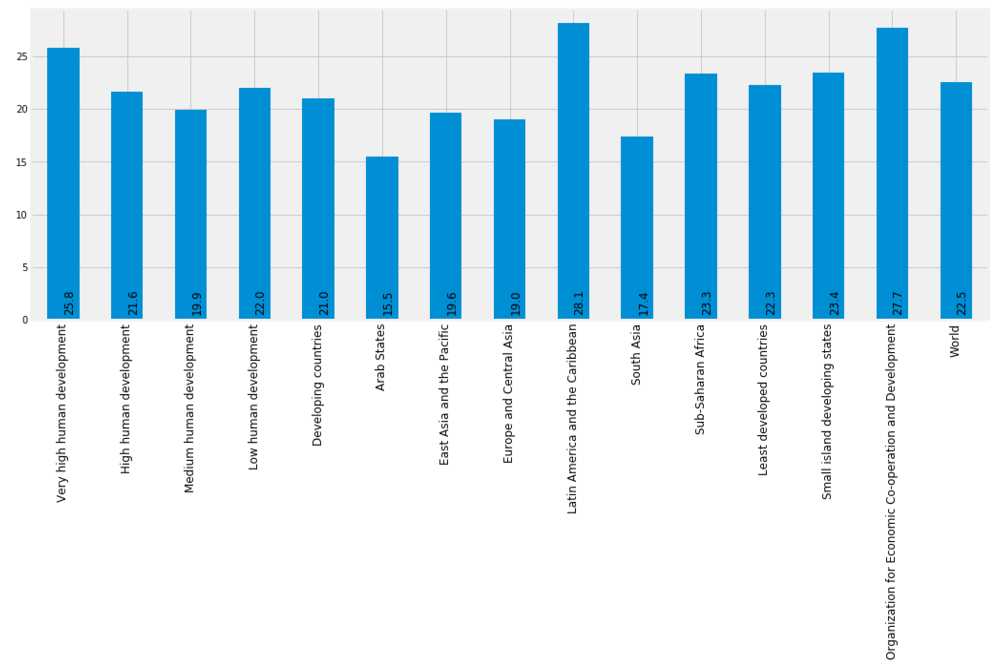
f,ax=plt.subplots(3,1,figsize=(16,6),sharex=True) axs = ax.ravel() col = [‘Population Ages 15–64 (millions) 2015‘,‘Population Under age 5 (millions) 2015‘, ‘Population Ages 65 and older (millions) 2015‘,‘Human development groups‘] continent_hdi[col].plot(ax=axs[0],kind=‘line‘) axs[0].set_title(‘Population by Age‘) col = [‘Total Population (millions) 2015‘, ‘Total Population (millions) 2030‘,] continent_hdi[col].plot(ax=axs[1],kind=‘line‘) axs[1].set_title(‘Total Population‘) col = [‘Population Average annual growth 2000/2005 (%) ‘,‘Population Average annual growth 2010/2015 (%) ‘] continent_hdi[col].plot(ax=axs[2],kind=‘line‘) axs[2].set_title(‘Population Growth %‘) plt.xticks(np.arange(15),continent_hdi[‘Human development groups‘],rotation=90); #axs[2].set_xticklabels([x for x in continent_hdi[‘Human development groups‘]], rotation=90);
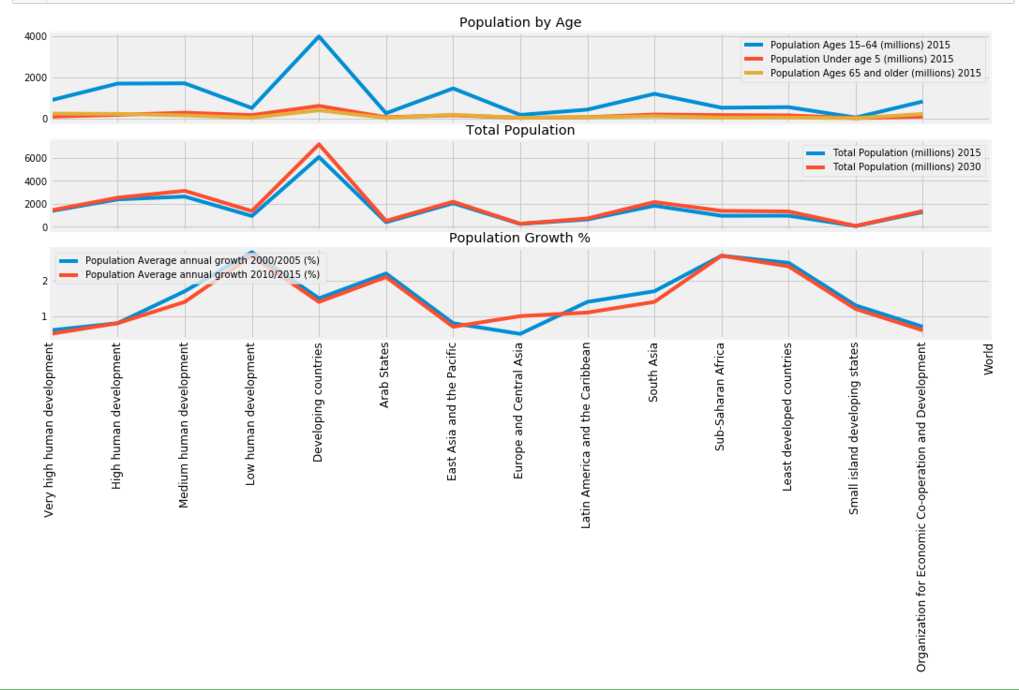
f,ax = plt.subplots(1,2,figsize=(16,6)) value = (hdi[[‘Employment in agriculture (% of total employment) 2010-2014‘,‘Country‘]].sort_values(by=‘Employment in agriculture (% of total employment) 2010-2014‘)[:10]) sns.barplot(value[‘Employment in agriculture (% of total employment) 2010-2014‘],value[‘Country‘],palette=‘cool‘,ax=ax[0]) ax[0].set_title(‘Bottom 10 country Employed in agriculture‘) for i, v in enumerate(value[‘Employment in agriculture (% of total employment) 2010-2014‘]): ax[0].text(0,i, round(v,2),fontsize=10,color=‘k‘) value = (hdi[[‘Employment in agriculture (% of total employment) 2010-2014‘,‘Country‘]].sort_values(by=‘Employment in agriculture (% of total employment) 2010-2014‘,ascending=False)[:10]) sns.barplot(value[‘Employment in agriculture (% of total employment) 2010-2014‘],value[‘Country‘],palette=‘Wistia‘,ax=ax[1]) ax[1].set_title(‘Top 10 country Employed in agriculture‘); for i, v in enumerate(value[‘Employment in agriculture (% of total employment) 2010-2014‘]): ax[1].text(0,i, round(v,2),fontsize=10,color=‘k‘)
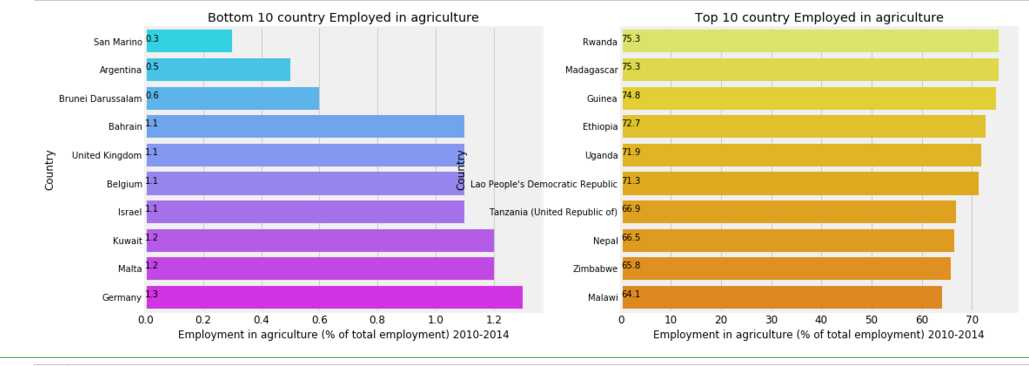
f,ax = plt.subplots(1,2,figsize=(16,6)) value = (hdi[[‘Total Unemployment (% of labour force) 2015‘,‘Country‘]].sort_values(by=‘Total Unemployment (% of labour force) 2015‘)[:10]) sns.barplot(value[‘Total Unemployment (% of labour force) 2015‘],value[‘Country‘],palette=‘cool‘,ax=ax[0]) ax[0].set_title(‘Bottom 10 country by Unemployment‘) for i, v in enumerate(value[‘Total Unemployment (% of labour force) 2015‘]): ax[0].text(0,i, round(v,2),fontsize=10,color=‘k‘) value = (hdi[[‘Total Unemployment (% of labour force) 2015‘,‘Country‘]].sort_values(by=‘Total Unemployment (% of labour force) 2015‘,ascending=False)[:10]) sns.barplot(value[‘Total Unemployment (% of labour force) 2015‘],value[‘Country‘],palette=‘Wistia‘,ax=ax[1]) ax[1].set_title(‘Top 10 country by Unemployed‘); for i, v in enumerate(value[‘Total Unemployment (% of labour force) 2015‘]): ax[1].text(0,i, round(v,2),fontsize=10,color=‘k‘)
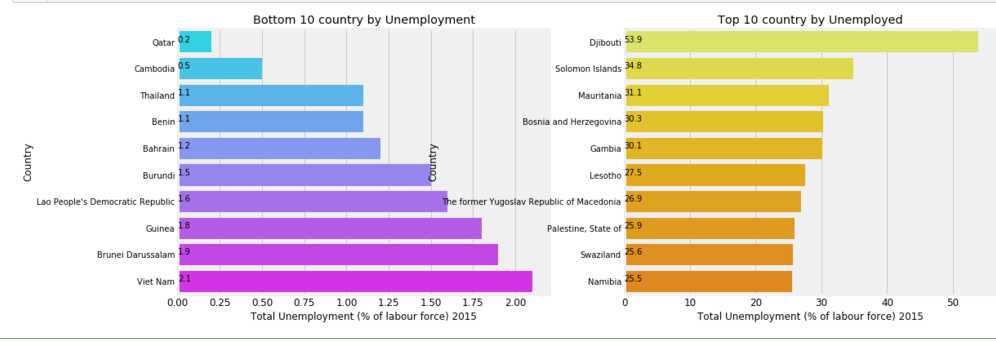
m = folium.Map(location=[0,0],zoom_start=2) m.choropleth(geo_data= geo_world_data,data = hdi, columns=[‘Country‘,‘Inequality in income (%)‘],key_on=‘feature.properties.name‘,name=‘Inequality in income (%)‘,fill_opacity=1,fill_color=‘GnBu‘,highlight=True, legend_name=‘Inequality in income (%)‘) folium.LayerControl().add_to(m) m
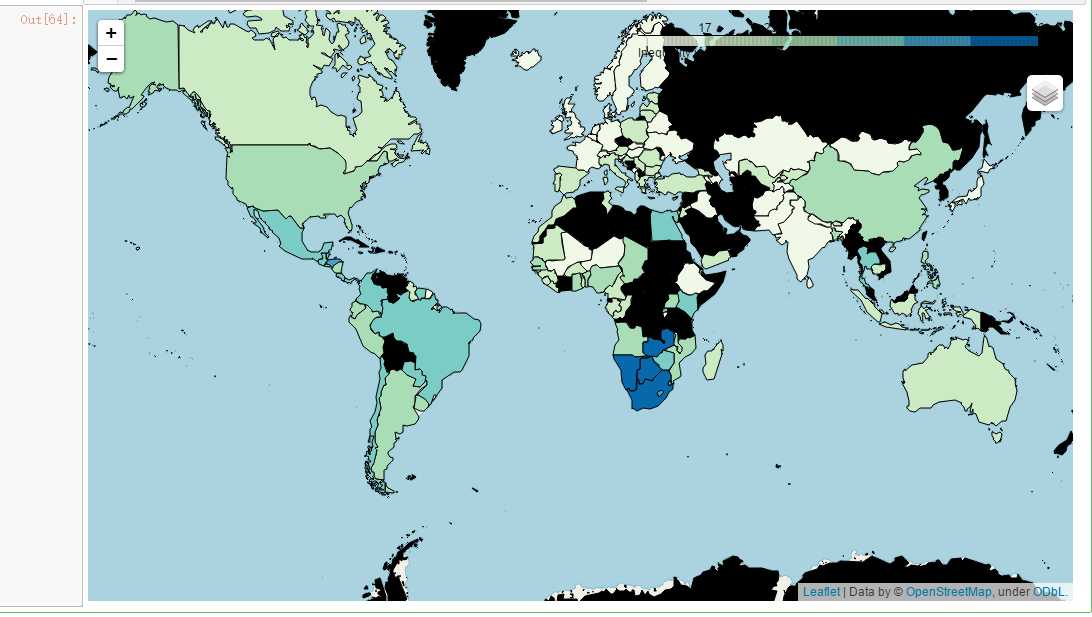
以上是关于吴裕雄--天生自然 PYTHON数据分析:人类发展报告——HDI, GDI,健康,全球人口数据数据分析的主要内容,如果未能解决你的问题,请参考以下文章